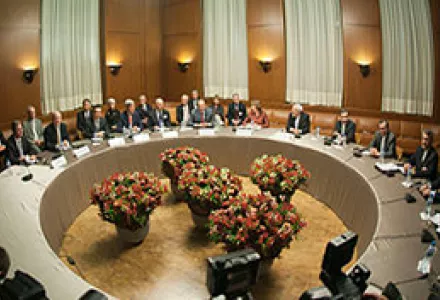And Then What? Imagining the Middle East if Nuclear Negotiations with Iran Fail
As nuclear negotiations with Iran go into their second year, and the US congress considers a new sanctions bill, the chances of reaching a comprehensive settlement are highly uncertain. The number of regional and global actors with stakes in Iran’s nuclear trajectory means that a failure of negotiations would have far-reaching consequences. Different scenarios leading to the breakdown of talks could produce distinct pathways for the aftermath of diplomatic failure. In particular, whether or not negotiations end with the P5+1 united or divided will affect the prospects of further multilateral sanctions, as well as the behavior of Iran and its regional rivals. The panel will examine these scenarios, and consider the consequences of a collapse of the negotiations for Iran’s nuclear policy, for regional politics and security, and for relations among the P5+1.

